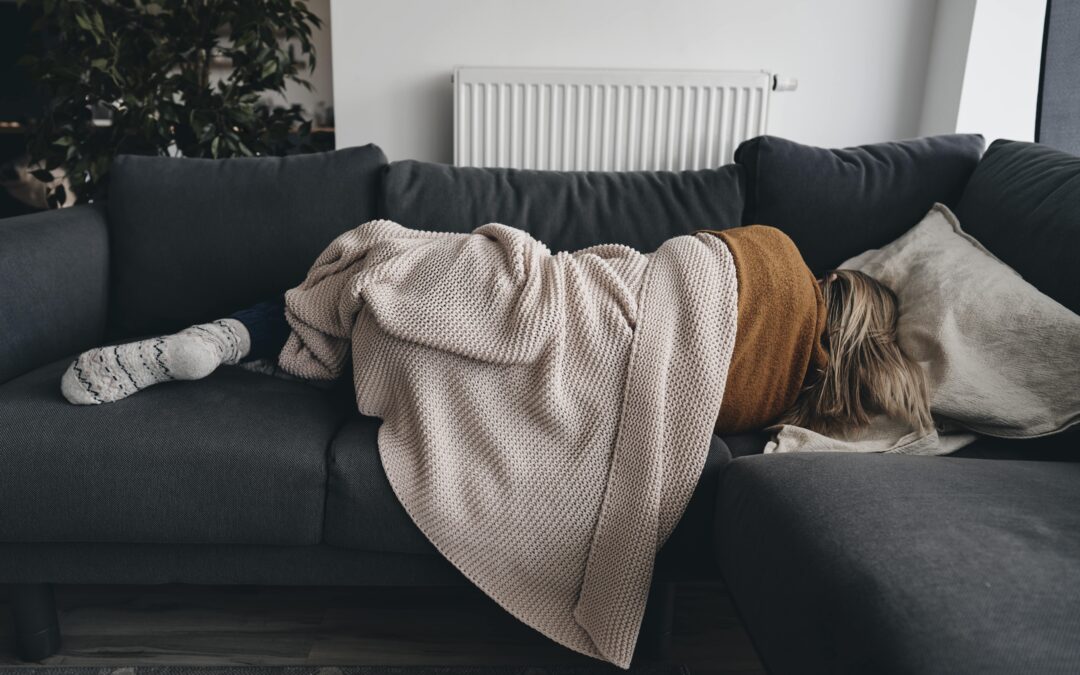What is insomnia?
Insomnia, or the inability to fall asleep, is the most common sleep disorder out there. 10% of people have long-lasting insomnia, while most people will experience short-term insomnia in their life. When it happens, it can be debilitating. Lack of sleep can create a whole host of issues the next day such as tiredness, irritability, lack of attentiveness, issues concentrating, and in long-term affect a persons relationships, work performance, physical safety, and even affect a persons ability to manage weight.
In long-term, lack of sleep takes a toll on overall health affecting a persons physical and emotional wellbeing.
Insomnia, Anxiety, & Depression on the Rise
Over the past few years insomnia has become more prevalent than before with 1 in 4 people suffering from insomnia; whereas previously it was 1 in 6. Our fast-paced, high-anxiety world may play a large part in the rise of our inability to doze off at a normal hour. From the technology at our fingertips, to our work-from-home lifestyles, to a rise in post-covid anxiety & depression, theres no shortage on why we might not be able to get our 7-9 hours a night.
Insomnia, anxiety, and depression are quite closely linked. Due to things like increased isolation, job & food insecurities, fear of getting sick from covid 19, fear of getting the covid vaccines, rising food & gas prices, these last 2 years have provided ample opportunities triggering our stress responses. With so much to think about in our daily lives and trying to find solutions to our endless list of issues, it can be hard to turn our brains “off” and rest..
The world health organization indicates that there has been a 25% increase in prevalence of anxiety & depression worldwide.
Bottom line: Insomnia is horrible to deal with and can snowball into other disorders like anxiety & depression; these three disorders can feed into one another and put us into a vicious, sleepless, anxiety-ridden cycle. So how can we handle it when it hits us? Oftentimes, we rely on prescription medicines to address ailments and disorders, but are there other ways to help push against insomnia or prevent it before it strikes?
Common Prescription Treatments for Insomnia
While prescription medications may be necessary, they come with cons in general as well. Here are some common prescriptions one might be prescribed for insomnia management.
- Benzodiazepines are a class IV controlled substance that help to send calming communications in the brain via the neurotransmitter gamma-aminobutyric acid; therefor reducing reactivity to stimuli and the activity of the nerves. Choosing benzodiazepines to combat insomnia does come with warning. They can become addictive as well as slow respiration if combined with opioids.
-
Nonbenzodiazepine are a group of prescription medications that essentially have the same risks, benefits, and side-effects as benzodiazepines. The difference being that they are completely different on a chemical level and so unrelated to benzodiazepines.
- Antidepressants are also used to help treat insomnia as most antidepressant drugs have a commonly shared side-effect of drowsiness. In general, antidepressants or selective serotonin reuptake inhibitors (SSRIs) cause drowsiness as they encourage more of the the feel-good chemical serotonin which is a precursor to melatonin – the chemical that tells our body to sleep. Serotonin interestingly enough also plays a role in wakefulness depending on which part of the brain it comes from. As with benzos and non-benzos, antidepressants for insomnia should be approached carefully – they too come with risk of addiction as well as low libido, emotional numbness, and even weight gain to name a few.
7 Natural Remedies for Insomnia
Not all treatments have to be pill and drug focused. While Western medicine has heavily promoted the idea that prescription medications are the way to go for treatments and cures of any and all issues, there are definitely holistic and natural ways that we can implement to aid our bodies against issues such as insomnia. Here’s a few research-backed ways of falling asleep without the drugs.
1) Taking Melatonin for Insomnia
Studies have shown that oral ingestion of melatonin can help over a period of time with sleep issues.
Melatonin is produced naturally in your body, but that production can fluctuate depending on a whole bunch of different factors such as screen time, meals, natural light, stress, and more.
Taking a melatonin supplement can help solidify your body onto a better path for frequent rhythms of melatonin when you’re experiencing moments where you might be off the proper flow for various reasons.
2) Treating Insomnia with Magnesium Supplements
Another natural option for addressing insomnia is magnesium supplements.
In a study done in 2012, researchers found that people that took a daily 500 mg supplement of magnesium can aid elderly people in falling asleep, as well as helping them wake up faster and more energized. It’s hypothesized that there’s a similar effect for younger folks, but there hasn’t been a specific study that’s performed and proven this.
Integrative medicine specialist Naoki Umeda, MD, has stated that, “Overall, the evidence for magnesium is thin, but some people have found it helps them.”
3) Lavender Oil and Supplements for Insomnia
 Lavender oil capsules are beginning to see a rise in popularity as a mix between holistic and traditional Western medicine solution for insomnia and other ailments.
Lavender oil capsules are beginning to see a rise in popularity as a mix between holistic and traditional Western medicine solution for insomnia and other ailments.
In a 2014 meta study on lavender capsules, researchers found all sorts of uses for them, from insomnia to depression to anxiety disorders.
They most noted that people with emotional disorders show reduced insomnia symptoms when on a regular lavender capsule. And while lavender capsules are a quick and easy solution, there’s also lavender oils, lavender tea, and lavender sprays that can help add a bit more lavender into your life.
4) Mindful Meditation for Insomnia
Meditation is a proven method of relaxation, and its effects on stress and the way the brain functions are well-known. Meditation is such an effective sleep aid, it helps people without sleep disorders. Mindful meditation also assists people with chronic insomnia deal with daily stressors that might aggravate their insomnia even more than normal.
The science behind meditation as a sleep aid is that it allows your brain to lower its stress, bringing it to a more relaxed state that’s more conducive to falling asleep faster.
Mindful mediation almost primes the brain for a quieter mode of existence, which aids in sleeping quicker and deeper. While quantifying how much you should meditate or how long your meditations sessions should last for you to receive these benefits are difficult to measure, finding a meditation style that fits your lifestyle and way of thinking can be a great place to start.
5) Reduce Insomnia with Exercise
Exercise isn’t just good for energizing you throughout the day; it helps promote a healthier circadian rhythm. One study found that 150 minutes of exercise a week for 6 months helped significantly reduce insomnia, depression, and anxiety symptoms. Exercise is a great way to combat insomnia because it’s so malleable; how, when, and where you exercise can all be up to you. It’s recommended to do at least 15-20 minutes of exercising per day to feel the effects of the exercise on your sleep patterns. Whether that’s a light jog or an intense workout regiment, exercise will help reduce short-term and long-term insomnia symptoms.
6) Yoga for Insomnia
 While technically this counts as “exercise,” many forms of yoga are more relaxing and restful than typical exercise. Some specific forms of yoga such as Ashtanga and Yin allow you to perform it at your own pace or focus on slow, seated movements that help engage the body in a more relaxing manner than an exercise. Other focus on breathing exercises while engaged in simpler and less strenuous stances. There’s a yoga variation for everyone out there, and finding one that’s right for you can help engage your body, help release stress, and eliminate a lot of unneeded issues from short-term insomnia.
While technically this counts as “exercise,” many forms of yoga are more relaxing and restful than typical exercise. Some specific forms of yoga such as Ashtanga and Yin allow you to perform it at your own pace or focus on slow, seated movements that help engage the body in a more relaxing manner than an exercise. Other focus on breathing exercises while engaged in simpler and less strenuous stances. There’s a yoga variation for everyone out there, and finding one that’s right for you can help engage your body, help release stress, and eliminate a lot of unneeded issues from short-term insomnia.
7) Improve Symptoms of Insomnia Through Massage Therapy
Another way to pull the stress from your body is through massage therapy. Similar to yoga, massage therapy attempts to engage your muscles in a way that reduces the stress they have from the day’s activities. A 2015 research study found that massage therapy actually improved the symptoms of insomnia better than most prescription sleep aids. As well, many people who engage in massage therapy also feel less groggy and more energized when they wake up.
Don’t Sleep On These Tips
Insomnia, whether short term or long term, can be a hassle to deal with. When we’re tired and ready for bed, the worst thing is to not be able to fall asleep, and losing sleep for even just one day can begin to take a serious toll on your mental, emotional, and physical health. Hopefully some of these tips can help your head back onto the pillow and sleeping the night away!

